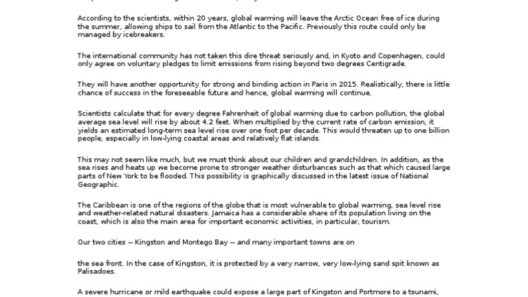As global temperatures continue to rise and the specter of climate change looms larger, corporations are finding themselves at a crossroads. The traditional paradigm of corporate governance, narrowly focused on profit maximization, is rapidly evolving. In the boardrooms of the 21st century, directors are venturing beyond mere fiscal responsibilities to embrace environmental stewardship as a core mandate. This transformation is not merely altruistic; it is a strategic imperative. In this piece, we delve into how companies are strategically responding to the pressing challenges posed by global warming.
First and foremost, a plethora of companies have taken robust actions to reduce their carbon footprints. The commitment to sustainability is manifesting in various forms—ranging from net-zero emissions goals to an aggressive pivot toward renewable energy sources. Multinational corporations such as Microsoft, Amazon, and Apple have publicly pledged to eliminate carbon emissions by 2030 or sooner. This shift is not merely a public relations effort; it stems from a profound recognition of the business risks associated with climate change. Regulatory frameworks are tightening, consumer expectations are shifting, and the economic imperative for sustainable operations has never been more acute.
Moreover, innovation stands at the forefront of corporate responses to climate change. Technological advancements are enabling businesses to adopt greener practices with unprecedented efficiency. Electric vehicles (EVs) are surging in popularity, catalyzed by corporate investments in charging infrastructure and research into battery technologies. Companies dedicated to clean energy, such as Tesla, are not only disrupting traditional automotive markets but also serving as harbingers of change throughout entire industries. These advancements provide companies an opportunity to rescue their competitive edge whilst contributing to a more sustainable future.
Investment in sustainable practices is another pivotal theme. The trend of ESG (Environmental, Social, and Governance) investing has taken hold, with institutional investors routinely demanding transparency on climate-related risks from the companies in which they invest. Asset managers and hedge funds are increasingly scrutinizing corporate strategies, spurring demand for sustainability reports. These documents go beyond regulatory compliance; they disclose a company’s commitment to tackling climate change. There is an emergent realization that sustainable companies, those with comprehensive environmental strategies, can yield superior long-term returns.
Furthermore, corporate social responsibility (CSR) has expanded its periphery to account for environmental impacts deeply ingrained in operational strategies. Beyond simplistic philanthropic gestures, CSR initiatives are increasingly integrated with core business operations. For instance, Unilever’s Sustainable Living Plan is an exemplary case, whereby the company commits not only to reducing environmental impact but also to enhancing livelihoods across its value chain. Such holistic approaches exemplify how corporations can reconcile profitability with planet-centric missions.
Inter-industry collaborations also underscore significant shifts in the corporate landscape. Corporations are joining forces with NGOs, governments, and research institutions to influence policy and develop innovative solutions to climate challenges. The World Economic Forum’s initiatives on sustainability have seen cross-sector partnerships emerge, tackling systemic risks posed by climate change through a collective intelligence approach. These collaborations foster transparency and pave the way for executable climate strategies, demonstrating that collective action is paramount to addressing global warming.
As businesses transform, the role of corporate culture cannot be overstated. Corporations are recognizing the importance of embedding sustainability values into their organizational culture. It is not enough to manage external perceptions; buy-in from employees at every level is essential. Companies are increasingly fostering environments that empower employees to contribute to sustainability goals. Initiatives focused on reducing waste, adopting circular economy principles, and fostering sustainable commuting practices are emerging within workplaces. Such cultural shifts indicate a recognition that climate responsibility is a collective duty and that every stakeholder plays an integral role.
Global supply chains are also undergoing significant reevaluation. Companies are turning inward, assessing the sustainability of their entire supply chains and prioritizing those that align with their climate policies. This scrutiny extends to sourcing materials, as disclosures regarding the environmental impacts of extraction and production processes become critical. Firms now hold their suppliers accountable for adhering to sustainability benchmarks, thereby amplifying the ripple effects throughout interconnected industries. Such meticulous evaluation does not solely mitigate risks; it cultivates a market where sustainability is a competitive edge.
The implementation of policy advocacy is another avenue through which companies can exert influence. The integration of corporate lobbying efforts focused on climate policies into the wider narrative of corporate governance is increasingly common. A majority of Fortune 500 companies are becoming vocal advocates for comprehensive climate legislation. They recognize that proactive engagement with policymakers is essential for creating a regulatory environment conducive to sustainable practices. These efforts underscore the pivotal role that the private sector can play in steering societal shifts towards climate resilience.
Furthermore, adapting to the realities of climate change also entails cultivating resilience. Businesses worldwide are assessing climate-related risks comprehensively, adapting their strategies to ensure operational continuity under unfavorable conditions. Companies are investing heavily in infrastructure designed to withstand extreme weather events, fluctuating natural resources, and supply chain disruptions caused by climate-related shifts. This tactical pivot ensures that they remain viable amidst an increasingly unpredictable climate landscape.
Lastly, as consumers become more environmentally conscious, their purchasing decisions increasingly reflect this paradigm shift. Companies that proactively address climate change and transparently communicate their sustainability strategies are likely to gain a competitive advantage. Brand loyalty is evolving, and companies are emerging as champions of transparency and accountability. This newfound affinity for environmentally responsible businesses is reshaping consumption patterns, fostering an economic environment where climate consciousness drives market trends.
In summation, the evolving narrative surrounding corporate responsibility in the face of climate change demands a reevaluation of established norms. Companies are emerging from the confines of traditional profit-driven motivations to embrace a broader ethos of stewardship. As businesses recognize the profound impacts of global warming, their responses are characterized by innovation, investment, collaboration, and cultural transformation. The transition toward sustainable practices represents a remarkable shift in the corporate landscape—one that promises not only the mitigation of environmental degradation but also the catalysis of a new golden age for sustainable business. The boardroom is no longer an isolated domain; it is the nerve center for developing holistic answers to humanity’s most pressing challenges.





